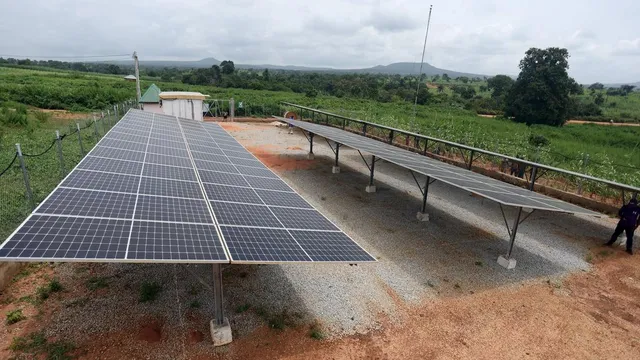
Sun King aims to triple sales in Nigeria with World Bank backing
2025-05-21 07:41- Sun King sold over 2 million solar kits in Nigeria over the past three years.
- The company secured an $80 million loan from the IFC to support sales growth in Nigeria.
- The firm plans to triple its sales in Nigeria, targeting the vast market of nearly 90 million people without electricity.
Express your sentiment!
Insights
Sun King, a Kenya-based solar power company, has made significant strides in the African market, particularly in Nigeria, which ranks as one of the most electricity-deprived countries globally. In recent years, the company has sold over 2 million solar kits in Nigeria, primarily within a three-year timeframe. The firm is actively seeking to capitalize on its success in Nigeria by securing an $80 million loan from the International Finance Corporation (IFC) and a local Nigerian bank to meet its ambitious target of tripling its sales over the next few years. This move marks a critical financial inflection point for Sun King as it aims to expand its footprint in emerging markets with substantial energy needs. Founder and CEO T. Patrick Walsh has indicated that Nigeria is a promising market due to what he describes as the 'lowest rates of non-payment' for its solar products, which reflects a growing demand and uptake of renewable energy solutions in the region. In its efforts to address the nearly 90 million Nigerians currently without electricity, Sun King is replicating a successful model it previously established in Kenya, where solar energy solutions have penetrated one in five households. The company acknowledges that while the upfront costs for solar installations can be prohibitively high, innovative financing solutions like affordable payment plans are essential to making these products accessible to lower-income households. Though the average cost for solar setups can reach $4,000 in Nigeria, inclusive payment options have encouraged adoption among customers who otherwise might not afford such technology. The funding from the World Bank through the IFC is expected to provide substantial backing for scaling up operations and expanding the company's market reach, not only in Nigeria but also in other African countries like Tanzania, Malawi, and Togo, where Sun King anticipates rapid growth. The company's shift toward local currency financing, as illustrated by previous loans from lenders such as South Africa’s Standard Bank, is a strategic decision to mitigate risks associated with foreign exchange volatility, ensuring more stable and sustainable operations in the local contexts. As a major player in renewable energy and climate technology, Sun King's commitment to addressing energy poverty in African countries falls in line with broader international initiatives like the Mission 300 agenda, which seeks to provide access to electricity for 300 million people in sub-Saharan Africa by 2030. The convergence of innovative financing, local needs, and climatic responsibilities positions Sun King at the forefront of the renewable energy movement, symbolizing hope and opportunity for millions living without reliable access to electricity.
Contexts
The World Bank plays a vital role in financing renewable energy initiatives across Africa, aiming to address the continent's energy needs and enhance sustainable development. In recent years, the World Bank has recognized that improving access to energy for millions of Africans is crucial for economic growth and reducing poverty. As traditional energy sources often contribute to environmental degradation and health issues, the shift toward renewable energy sources such as solar, wind, and hydropower presents an opportunity for Africa to leapfrog outdated energy infrastructures and invest in cleaner, sustainable alternatives. The bank's funding has facilitated numerous projects, focusing on capacity building, technology transfer, and innovative financing mechanisms to leverage additional investment from the private sector and other stakeholders. Many countries in Africa benefit from the World Bank's financing for renewable energy projects. For instance, projects in countries like Kenya and South Africa have shown a marked shift toward renewable energy adoption, leading to increased energy access and reduced reliance on fossil fuels. The World Bank's financing often comes in the form of grants, low-interest loans, and technical assistance, enabling countries to develop infrastructure that supports renewable energy generation, distribution, and consumption. Such investments not only lead to increased electricity access but also create jobs, stimulate local economies, and contribute to national energy independence. The World Bank also emphasizes the importance of policy frameworks and governance structures that support renewable energy deployment. By working closely with African governments, the bank aims to promote regulatory environments conducive to private sector investment and public-private partnerships. This collaborative approach allows nations to develop tailored strategies to meet their unique energy challenges while leveraging the financial resources provided by the World Bank. Additionally, the bank's commitment to knowledge sharing, capacity building, and stakeholder engagement further ensures that investments lead to sustainable and equitable development outcomes. In conclusion, the World Bank's financing for renewable energy initiatives in Africa not only addresses immediate energy access challenges but also fosters long-term sustainable development. By supporting countries in their transition to renewable energy, the bank contributes to global efforts to combat climate change while enhancing economic resilience and social equity in Africa. The growing emphasis on renewable energy, guided by the World Bank's strategic investments and expertise, positions Africa to harness its abundant renewable resources and build a sustainable energy future.